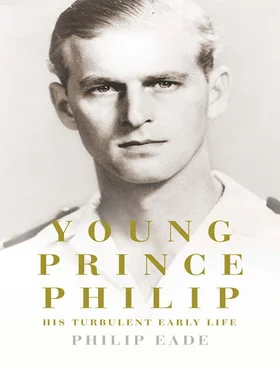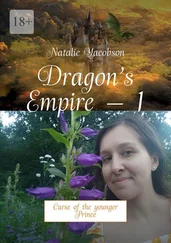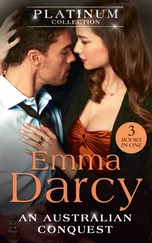Philip Eade
Young Prince Philip
His Turbulent Early Life

To my sisters Fiona, Belinda and Jo
Author’s Note
Prologue
1 Kings of Greece
2 House of Battenberg
3 Boy’s Own Story
4 Family in Flight
5 Orphan Child
6 Prep School Days
7 Dodging the Hitler Youth
8 Off to Gordonstoun
9 Blow after Blow
10 The Man with the Plan
11 A Good War
12 Osla and Lilibet
13 Steady on, Dickie
14 Nothing Ventured …
15 True Brit
16 Royal Wedding
17 Duke of Hazards
18 Their Happiest Time
19 Second Fiddle
20 Oh, the Future!
21 Her Liege Man
Photographic Insert
Notes
Bibliography
Searchable Terms
About the Author
Other Books by Philip Eade
Credits
Copyright
About the Publisher
The idea for this biography came a little unexpectedly from a book I briefly toyed with writing about prominent ufologists in the period just after the Second World War. In the course of cobbling together a proposal to try and persuade my sceptical agent, I was struck by the revelation in Francis Wheen’s book How Mumbo Conquered the World that Prince Philip’s equerry once went off at the prince’s bidding to meet an extraterrestrial humanoid at a house in Ealing. The equerry in question, Sir Peter Horsley, had been on the prince’s staff from 1952 until 1955, before climbing to great heights in the RAF. ‘Oh God,’ sighed an official at the Ministry of Defence when Horsley’s memoirs came out in 1997, ‘how unfortunate that the public will learn that the man who had his finger on the button of Strike Command was seeing little green men.’
For better or worse, the public also learned that, for several years in the early 1950s, Prince Philip had enthusiastically swapped UFO stories with his uncle Louis ‘Dickie’ Mountbatten, a fellow subscriber to the Flying Saucer Review, and kept himself abreast of developments in the field. According to Horsley, ‘Prince Philip was open to the immense possibilities leading to space exploration, while at the same time not discounting that, just as we were on the fringe of breaking into space, so older civilizations in the universe might already have done so’. Horsley also recalled that the prince ‘agreed that I could investigate the more credible reports provided that I kept it all in perspective and did not involve his office in any kind of publicity or sponsorship’. A number of witnesses were invited to Buckingham Palace to discuss their experiences, partly, as Horsley later explained, to ‘put them on the spot’ and to test their honesty ‘in the presence of royalty, a method as effective as any truth serum’.
This was all intriguing news to me, yet the more I read about Prince Philip, the more it became apparent that his interest in flying saucers was very far from being the most intriguing thing about him. He is, after all, famously revered as a living god by the islanders of Vanuatu in the South Pacific. More than anything, though, I was drawn to the remarkable story of his early life, which seemed to be overflowing with drama and colour – and yet there did not seem to be a particularly full or dispassionate written account of it.
I am extremely grateful to everyone who helped me in various ways with this book. At Buckingham Palace, I owe a particular debt of gratitude to Sir Brian McGrath, Prince Philip’s extra equerry. While Sir Brian never pretended that my project was especially welcome, neither was he in the least bit obstructive. On the contrary, he was very helpful in enabling interviews with Prince Philip’s friends and relations. Both he and Dame Anne Griffiths, Prince Philip’s librarian and archivist, also helped with access to various papers at Buckingham Palace, the Royal Archives and the Hesse State Archives in Darmstadt, and took the trouble to read an early draft of my manuscript and suggest corrections of fact and interpretation. It should be stressed, however, that this biography is in no sense approved or authorized, and I was therefore under no obligation to omit things and incidents that might be deemed discreditable to Prince Philip or the royal family. It was never my intention to be sniping or mean-spirited. However, I knew that for the portrait to be credible to neutral readers, some of the foibles, or perceived foibles, needed to be given an airing alongside Prince Philip’s finer qualities. I am equally confident that readers will respond more sympathetically towards him in consequence. I accept full responsibility for any errors there may be in the final version.
I am extremely grateful to all those who agreed to talk to (or correspond with) me about various aspects of Prince Philip’s early life, including, in no particular order, Countess Mountbatten of Burma, Lady Pamela Hicks, Lady (Myra) Butter, Philip Ziegler, Kenneth Rose, The Hon. Mrs Janie Spring, Captain North Dalrymple-Hamilton, Lord Gainford, The Hon. Mrs Sarah Baring, The Dowager Countess of Cromer, Lady Macmillan, Lady Margaret Stirling-Aird, the Dowager Duchess of Devonshire, The Hon. Mrs (Oliver) Dawnay, Robin Dalton, Daphne Davie (née Brock), Major General David Alexander, Air Vice-Marshal Sir John Severne, Patrick Kidner, Sir Jeremy Chance, Clive Stewart-Lockhart, Landgrave Moritz of Hesse, Prince and Princess Ludwig of Baden, Professor Max Boisot, Peter Saunders, Leading Signalman Ted Longshaw, Lester May, Jimmy Taylor, John Wynne and the late Lord (Aubrey) Buxton.
Among the archivists who helped me, I am grateful to Pamela Clark at the Royal Archives, Windsor Castle; Professor Chris Woolgar, Archivist of the Mountbatten Papers at the University of Southampton; Professor Echart G. Franz at the Hesse State Archives in Darmstadt; Michael Churchill at Cheam; Michael Meister and Sophie Weidlich at Schule Schloss Salem; Louise Harvey at Gordonstoun; the staff of the National Archives at Kew in London; the staff of Churchill College Archives in Cambridge; the staff of the British Library; the staff of the newspaper library at Colindale, London; and the staff of the Telegraph newspaper library. I am also extremely grateful to the staff of the London Library, where the majority of this book was written.
I am greatly indebted to various published sources. Among these, Hugo Vickers’s scrupulously researched authorized biography of Prince Philip’s mother, Alice: Princess Andrew of Greece, was an invaluable source of otherwise unavailable family information and letters, many fragments of which I have cited.
Among the biographies of Prince Philip himself, those that I found most useful were by Basil Boothroyd (Philip: An Informal Biography), Queen Alexandra of Yugoslavia (Prince Philip: A Family Portrait), Tim Heald (The Duke: A Portrait of Prince Philip) and Gyles Brandreth (Philip & Elizabeth: Portrait of a Marriage). I also relied heavily on several of Philip Ziegler’s books, principally his outstanding biography Mountbatten, and on the excellent royal biographies by Sarah Bradford (George VI and Elizabeth), Ben Pimlott (The Queen), Robert Lacey (Majesty and Royal), and William Shawcross (Queen Elizabeth, the Queen Mother). Other particularly useful books included Jonathan Petropoulos’s Royals and the Reich, a study of the relationship between the Hesse family and the Nazi regime, and Graham Turner’s Elizabeth: The Woman and the Queen.
My literary agent, Caroline Dawnay, was, as ever, a constant source of sound advice, excellent ideas and much needed encouragement. I was extremely fortunate to have as my editor at Harper Press Martin Redfern, who was a pleasure to work with and made numerous editorial suggestions which greatly improved the book. My thanks, too, to Richard Collins, for his painstaking copy editing, to Sarah Hopper, for her very willing and resourceful picture research, and to Christopher Phipps, for his exemplary index. I am particularly grateful also to Victoria Lane, who read and edited an early draft of the first half of the book, and did much to make it better, and to Robert Gray, who very generously agreed to read the whole manuscript, in the course of which he tightened a great many of my loose sentences and made countless perceptive comments.
Читать дальше













